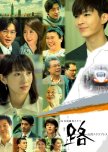Considering there were complications with some unfilmed scenes due to the COVID-19, (according to the screenwriter); the drama itself was breathtaking.
Story:
The plot does a great job of delivering a heartwarming story while integrating the culture and history between Taiwan and Japan. Especially in a setting where the railway industry is dominated by men, it was eye-opening to view this story from a working female's perspective. The plot manages to develop the side characters' stories as they all later integrate. The only con is the incompletion of some of the side characters' stories (due to the pandemic).
Cast:
Watching the drama, you realize how they carefully chose the cast as they had to speak multiple languages (Japanese, English, and Mandarin). No matter which language the character spoke, they conveyed their thoughts. Even though it was the first time a lot of the cast members were working with each other, you couldn't sense that at all. According to the Taiwan cast, the auditions were highly competitive. The drama even challenged itself by casting some people (Li Zi Cheng and Wu Dai Yun) who did not have much experience but did a great job with their 'natural' acting as said by the director.
Music + Cinematography:
NHK dramas never disappoint me when it comes to cinematography and music. The music was composed by Shinya Kiyozuka, who did a beautiful job creating music that deepened the story. Tsunagaru Kokoro, the theme song of this drama (has both Japanese and Mandarin versions) is although short, describes the connection that stretches throughout history between Taiwan and Japan. Hopefully, NHK decides to release an official soundtrack soon.
The cinematography captures the scenery of Taiwan without distracting the viewer from the story. The details of the color grading portray the late 90s/early 2000s setting.
Rewatch Value:
I tend to not rewatch a lot of shows. However, this drama has so much to offer, it makes you want to watch it again.
In conclusion, every second of the film contributed to the drama. I was amazed by the balance between the Taiwan-Japan history and the character developments. Though people say there should’ve been more episodes, I think an additional episode would have stretched the story too much. I just wish I could have seen the fully developed story the production team idealized if it wasn’t affected by the pandemic.
Finally, I highly recommend looking into the links provided below that provide a better understanding of the production, cast, and story after completing the drama.
Behind the Scenes + Interview: https://youtu.be/liAGgbnEzRo https://youtu.be/H0astxpavIg
Taiwan Cast Interview: https://youtu.be/svtd6zv3VNI https://youtu.be/1IY07VTZD1g
Filming Locations: https://youtu.be/tX62P6OWTdM
Explanation of an ending that wasn't included in the film: https://twitter.com/Kumiko_Tabuchi/status/1266724842964828164?s=20
Story:
The plot does a great job of delivering a heartwarming story while integrating the culture and history between Taiwan and Japan. Especially in a setting where the railway industry is dominated by men, it was eye-opening to view this story from a working female's perspective. The plot manages to develop the side characters' stories as they all later integrate. The only con is the incompletion of some of the side characters' stories (due to the pandemic).
Cast:
Watching the drama, you realize how they carefully chose the cast as they had to speak multiple languages (Japanese, English, and Mandarin). No matter which language the character spoke, they conveyed their thoughts. Even though it was the first time a lot of the cast members were working with each other, you couldn't sense that at all. According to the Taiwan cast, the auditions were highly competitive. The drama even challenged itself by casting some people (Li Zi Cheng and Wu Dai Yun) who did not have much experience but did a great job with their 'natural' acting as said by the director.
Music + Cinematography:
NHK dramas never disappoint me when it comes to cinematography and music. The music was composed by Shinya Kiyozuka, who did a beautiful job creating music that deepened the story. Tsunagaru Kokoro, the theme song of this drama (has both Japanese and Mandarin versions) is although short, describes the connection that stretches throughout history between Taiwan and Japan. Hopefully, NHK decides to release an official soundtrack soon.
The cinematography captures the scenery of Taiwan without distracting the viewer from the story. The details of the color grading portray the late 90s/early 2000s setting.
Rewatch Value:
I tend to not rewatch a lot of shows. However, this drama has so much to offer, it makes you want to watch it again.
In conclusion, every second of the film contributed to the drama. I was amazed by the balance between the Taiwan-Japan history and the character developments. Though people say there should’ve been more episodes, I think an additional episode would have stretched the story too much. I just wish I could have seen the fully developed story the production team idealized if it wasn’t affected by the pandemic.
Finally, I highly recommend looking into the links provided below that provide a better understanding of the production, cast, and story after completing the drama.
Behind the Scenes + Interview: https://youtu.be/liAGgbnEzRo https://youtu.be/H0astxpavIg
Taiwan Cast Interview: https://youtu.be/svtd6zv3VNI https://youtu.be/1IY07VTZD1g
Filming Locations: https://youtu.be/tX62P6OWTdM
Explanation of an ending that wasn't included in the film: https://twitter.com/Kumiko_Tabuchi/status/1266724842964828164?s=20
Cet avis était-il utile?











